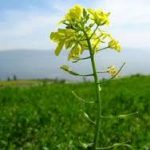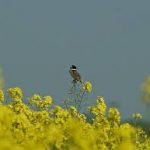31 He put before them another parable: “The kingdom of heaven is like mustard seed that someone and sowed in the field; took 32 it is the smallest of all the seeds, but when it has grown it is the greatest of shrubs and becomes a tree, so that the birds of the air come and make nests in its branches.” [Matthew 13:31-32, NRSV]
A question was raised over coffee on the parable of the mustard seed. A friend said that he was confused by the Sunday preacher who reminded the congregation that, according to ancient Jewish thinking, the birds that came to rest in the big tree which the tiny mustard seed had become, represented the evil ones. That coffee-corner chat offered an opportunity to discuss how people often get side-tracked when they read and discuss Gospel stories. Instead of rendering attention to the central messages first, they often get carried away talking about trivial and quite irrelevant issues that offer little if any positive elements for life-application.
So we suggested a return to the lager literary context in which the parable of the mustard seed is located, to see what Matthew is suggesting Jesus is actually teaching about the Kingdom of God. Located in Book Three (chapters 11-13) of a five-part (so Pentateuch-like) Matthean gospel composition, the parable of the mustard seed is one in a collection of seven parables, in rapid fire, within the discourse section of Part Three. They share the common theme of the reign of God.
- The Parable of the Sower (13:1-23) easily suggests two points for reflection. First, it alludes to the kingdom of God being here, and God’s reign will be a reality in spite of obstacles from the likes not only of opponents such as the scribes and the Pharisees, but also of indifferent or non-proactive believers. The teaching is optimistic, for the kingdom of God will prevail, regardless. Second, it speaks of the seeds of the kingdom, suggesting that they are always good, but they bear good harvests only when they fall on good soil. The soil represents different types of church members who are all supposed to “hear the Word, and do it”. Members of the faith community are tasked to tend to the soil, to be receptive and accountable, and being proportionate in words and deeds. This parable about sower, seeds and soil invites us to think more about what happens to us when we hear the word of God. Isaiah tells us that the Word comes as an invitation to allow God to permeate our life as water saturates soil. Jesus promises that if we allow the seed of the Word to grow in us, the results will be Immense. So the parable invites us to position our ears and our hearts to receive the “always more”.
- The parable of the darnel (13:24-30, 36-43) warns of counterfeit Christian living. Darnel is weed that resembles wheat and grows among the latter. Such is the reality of exploitation by evil doers. Yet, it is allowed to stay, for uprooting it now will hurt the good ones – the wheat. Justice will be meted out on the last day, however, as the darnel will be thrown into hell fire.
- The parable of the mustard seed (13:31-32) again optimistically speaks of the humble origin of the kingdom of God that grows and matures to magnificence. Although proverbially small, the mustard seed is not the smallest of seeds. Furthermore, the mustard “tree” is not an ordinary tree, but a shrub that can grow to a height of ten or so feet. Allegorically, Jesus is suggesting that the arrival of the kingdom or reign of God is marked by such small beginnings that they are hardly noticed. Indeed, the humble beginning of the “alleged” kingdom of God in such an “insignificant” personality as Jesus of Nazareth (“Can anything good come from Nazareth?” – John 1:46) was a scandal to Judaism and even to his own disciples. And yet, the point of the parable being its contrast, Jesus insists that from a humble beginning, as small as a mustard seed that gets ignored and neglected, God’s kingdom will soon grow into something huge, like a mustard shrub that easily accommodates all kinds of birds.
- The parable of the yeast (13:33) again illustrates the irresistible growth of the reign of God from small, seemingly insignificant beginnings.
- The parables of the treasure and the pearl (13:44-46) share a common theme of the rigorous demands of the kingdom. The kingdom is so precious to the one who embraces and enjoys it that the zeal to possess it demands a huge sacrifice. Like a treasure-hunter or a keen pearl merchant, therefore, one who comes across a hidden treasure or a pearl of great value will make the great sacrifice of liquidating all his other possessions in order to purchase the treasure of the one pearl. That investment on the kingdom will repay him handsomely.
- The parable of the net (13:47-50) speaks again of the presence of both good and wicked in the Church. As earlier, the same end-time solution is repeated here.
Speaking in parables, Jesus puts diverse people on equal footing, intending for all to initiate a process of consciousness change. When Jesus says, “Whoever has ears to hear, ought to hear,” he suggests a singular requirement, and that is, they must desire to understand more than before. It is the humble, the sincere, and the keen-hearted who will enjoy a miracle of harvest, as the haughty walk away empty. Jesus’ parables are spoken in symbolic language that affords God an opportunity to work in the hearts of willing listeners to help them comprehend “the secrets of the kingdom of heaven”. In familiar Catholic language, we might say that in Jesus’ parables, God is speaking in our human language and inviting us into communion. In the Chinese way of expressing what is at stake here, a way with which we are sometimes more at ease, the will of heaven is not located in heaven, but on earth, within human hearts. In other words, it is quite pointless to speak about the kingdom of God and the will of heaven and so on, if we do not find the very kingdom, will and values incarnated, and working, in human hearts.
Finally, parables are ultimately about spiritual wisdom. They are enigmatic and invite engagement and response. In every keen listener, therefore, the Holy Spirit is interiorly at work, facilitating understanding and increasing wisdom in the humble-at-heart.
Copyright © Dr. Jeffrey & Angie Goh, August 2018. All rights reserved.
You are most welcome to respond to this post. Email your comments to jeffangiegoh@gmail.com. You can also be dialogue partners in this Ephphatha Coffee-Corner Ministry by sending us questions for discussion.





